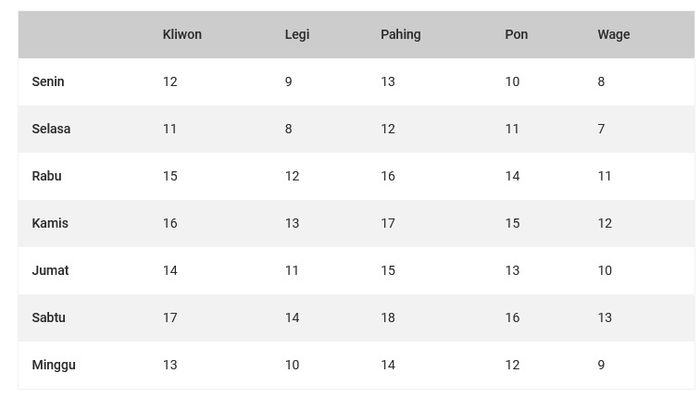Kapanlagi.com - Since ancient times until now, Javanese Primbon is still believed as an accurate prediction by some people. For those who believe, Javanese Primbon is also a guide in living their lives. Through a calculation, someone can determine auspicious days according to Javanese Primbon that are suitable for conducting a ritual or activity.
Auspicious days according to Javanese Primbon are believed to bring many benefits and keep away from various obstacles. In practice, auspicious days according to Javanese Primbon are sought after when someone is going to hold important events, such as weddings, moving houses, opening businesses, and so on.
Curious about the explanation of auspicious days according to Javanese Primbon and how to calculate them? To find out, just read the following explanation.
1. Good Days According to Javanese Primbon for Marriage

Good Day According to Javanese Primbon for Marriage (credit: google/via intisari.grid.id)
As mentioned earlier, good days according to Primbon are often sought after, especially for holding a wedding. To find a suitable auspicious day for a wedding, a calculation method needs to be done by calculating the neptu (numerical value) of both bride and groom.
The neptu is obtained from the value of the day of birth (Sunday, Monday, Tuesday, Wednesday, Thursday, Friday, Saturday) and the pasaran (Legi, Pahing, Pon, Wage, Kliwon). For more details, here is a list of good day values and pasaran.
Names of Days and Neptu Values
- Sunday: 5
- Monday: 4
- Tuesday: 3
- Wednesday: 7
- Thursday: 8
- Friday: 6
- Saturday: 9
Names of Pasaran Days and Neptu Values
- Legi: 5
- Pahing: 9
- Pon: 7
- Wage: 4
- Kliwon: 8
Meanwhile, good days according to Javanese Primbon for marriage can be obtained using the following formula:
Total neptu of the bride and groom + auspicious day number (divided by) 5 = (the result must be greater or have a remainder of 3)
For example, let's say the total neptu of the couple is 26. Then, the auspicious day numbers to be used are 2, 7, 12.
After obtaining several auspicious day numbers, refer to the table shown in the image. Based on the table, it is known that the auspicious days with a value of 12 are Monday Kliwon, Wednesday Legi, Thursday Wage, and Sunday Pahing.
2. Good Day According to Javanese Primbon for Opening a Business

Good Day According to Javanese Primbon for Opening a Business (credit: unsplash)
In addition to determining the wedding date, a good day according to Javanese Primbon is also sought for various other purposes. One of them is to find a good day to start a business. Opening a business on a good day is believed to bring many blessings and success.
The calculation for finding a good day to open a business is very easy. First, you only need to choose or pay attention to a specific market day, then calculate to check its compatibility with your birth date. For example, if your birth date is Saturday Pon. Then, you choose Wednesday Legi as the day for your business.
The calculation is as follows:
- Business Day Choice: Wednesday Legi = Value of 7 + 5
- Birth Date: Saturday Pon = Value of 9 + 7
Once you have the two values, add them together: 7 + 5 + 9 + 7 = 28
Then, divide it by 5, and the result is as follows: 28 : 5 = 5 remainder 3
From the result, you can check it in Pancasuda. In Pancasuda, a remainder of 3 means Bejo, which means it is suitable to open a business but may face challenges and may not be well-liked by people around.
In addition, there are still several meanings of the remaining numbers in Pancasuda, here are some of them.
- Remaining 1: It means Sandang, which means abundance of fortune.
- Remaining 2: It means Pangan, which means sufficient.
- Remaining 3: It means Bejo, which means wealthy but disliked by people around.
- Remaining 4: It means Loro, which means sickness and loss.
- Remaining 5: It means Pati, which means efforts will die or fail.
3. Good Day According to Javanese Primbon for Moving House

Good Day to Move House According to Javanese Primbon (credit: unsplash)
In addition to determining the wedding day and opening a business, another use of finding a good day is for moving house. In determining a good day according to Javanese Primbon, it can be done by adding up your neptu with the neptu number on the chosen day to move house. For example:
- You were born on Saturday Wage, so you have neptu 13.
- Your chosen day to move is Wednesday Pon, so the neptu is 14.
- Then, after adding them up, the result is 13+14= 27.
- Find the multiple of four below that number (27), so you get the number 24 (as a multiple of 6x4).
- Subtract them, so 27-24 = 3.
From the result, you can look into the list of prediction results in the list of good days according to Javanese Primbon for moving house, which include Guru, Ratu, Rogoh, Sempoyong. For a more detailed explanation, it is as follows.
1. Guru: Smooth fortune, respected, safe, prosperous.
2. Ratu: Abundant fortune, far from troubles, authoritative, feared, respected.
3. Rogoh: Easily entered by thieves, less harmonious and unhappy.
4. Sempoyong: Not comfortable at home, lots of difficulties and frequent quarrels.
From the calculation, the number obtained is 3, which means rogoh, which is "Easily entered by thieves, less harmonious and unhappy". Therefore, it is not recommended to move house on that day and it is recommended to choose another day.
4. Good Day for House Renovation According to Javanese Primbon

Good Day for House Renovation According to Javanese Primbon (credit: unsplash)
For Javanese people, belief in primbon (Javanese almanac) still remains strong until today. One of the things believed is the existence of good and bad days for house renovation. According to primbon Jawa, each day in the Javanese calendar has different characteristics and energies, so it is very important to choose the right day to start a home renovation project.
There are several steps that can be taken to calculate the auspicious day for house renovation according to primbon Jawa. The formula used to calculate the auspicious day for house renovation according to primbon Jawa is as follows:
(Neptu Weton: 4)
From this calculation, a remaining number can be obtained and used as a reference to match with the explanations in primbon Jawa. The explanation of the meaning of the auspicious day for house renovation is as follows:
- Remaining number 1 has a positive meaning, which means that if the house is renovated, the owner of the house will be respected. The renovated house will bring peace, fortune, and security.
- Remaining number 2 indicates that the house will be protected. With this, the owner of the house can be protected from various threats such as crime, theft, and other dangers.
- Remaining number 3 has a less favorable meaning. Renovating a house on a day with the remaining number 3 is believed to bring risks of illness, crime, or even other bad things.
- The remaining number 4 is considered to have a negative meaning. Renovating on days with this count is believed to make the occupants of the house more vulnerable to disease and various difficulties.
For example:
Someone falls on Saturday Pon, then the total of their neptu is 9 + 7 = 16. Next, the result of the sum of the neptu is divided by 4, which is 16 : 4 = 4. Based on Javanese astrology, the remaining number 4 has a less good meaning because it can bring difficulties.
5. Good Day for Circumcision According to Javanese Primbon

Good Day for Circumcision According to Javanese Primbon (credit: flickr)
Meanwhile, in determining the auspicious day for circumcision, Javanese astrology also has its own method. Not by calculation, the auspicious day for circumcision is determined by the titen method or observation that has been passed down from generation to generation.
In Javanese tradition, in relation to determining the auspicious day for circumcision, the Javanese month is divided into four groups. Later, each group of months is believed to have one or two days that are considered good for circumcision.
1. First Group of Javanese Months
In the months of Besar, Suro, and Safar, it is recommended to perform circumcision on Wednesday or Thursday.
2. Second Group of Javanese Months
Next, in the months of Mulud, Rabiul Akhir, and Jumadil Awal, the auspicious day for circumcision falls on Friday.
3. Third Group of Javanese Months
In the months of Jumadil Akhir, Rajab, and Ruwah, it is recommended to perform circumcision on Saturday and Sunday.
4. Fifth Group of Javanese Months
Meanwhile, in the last group of months, namely Puasa, Syawal, and Dzulkaidah, the auspicious days are Monday and Tuesday.
Those are some explanations about auspicious days according to Javanese astrology for determining wedding days, opening businesses, and moving houses. Hopefully useful and can answer your curiosity all this time.
COME JOIN WHATSAPP CHANNEL KAPANLAGI.COM SO YOU DON'T MISS THE LATEST UPDATES AND NEWS ABOUT THE ENTERTAINMENT WORLD BOTH DOMESTIC AND FOREIGN. CLICK HERE YES, KLOVERS!
(kpl/gen/psp)
Disclaimer: This translation from Bahasa Indonesia to English has been generated by Artificial Intelligence.

















